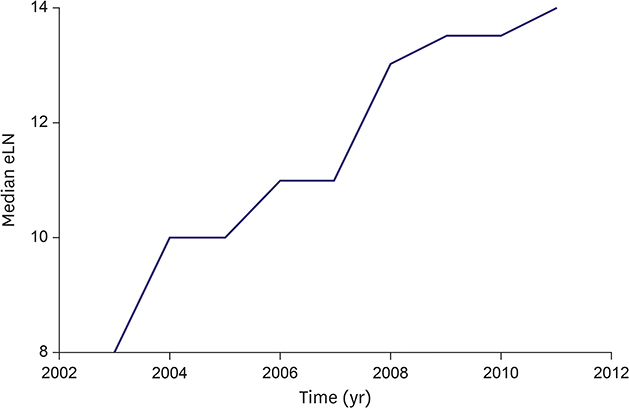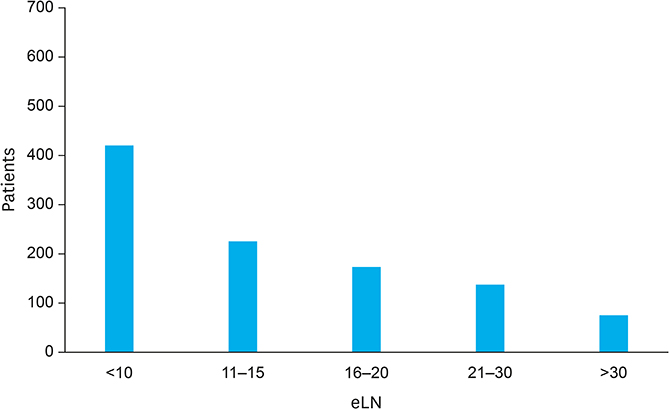J Gastric Cancer.
2017 Dec;17(4):306-318. 10.5230/jgc.2017.17.e35.
Greater Lymph Node Retrieval Improves Survival in Node-Negative Resected Gastric Cancer in the United States
- Affiliations
-
- 1Department of Surgery, The Pennsylvania State University, College of Medicine, Hershey, PA, USA. joyce.wong02@gmail.com
- 2Department of Public Health Sciences, The Pennsylvania State University, College of Medicine, Hershey, PA, USA.
- KMID: 2398797
- DOI: http://doi.org/10.5230/jgc.2017.17.e35
Abstract
- PURPOSE
Guidelines in western countries recommend retrieving ≥15 lymph nodes (LNs) during gastric cancer resection. This study sought to determine whether the number of examined lymph nodes (eLNs), a proxy for lymphadenectomy, effects survival in node-negative disease.
MATERIALS AND METHODS
The US National Cancer Database (2003-2011) was reviewed for node-negative gastric adenocarcinoma. Treatment was categorized by neoadjuvant therapy (NAT) vs. initial resection, and further stratified by eLN. Kaplan-Meier and Weibull models were used to analyze overall survival.
RESULTS
Of the 1,036 patients who received NAT, 40.5% had ≤10 eLN, and most underwent proximal gastrectomy (67.8%). In multivariate analysis, greater eLN was associated with improved survival (eLN 16-20: HR, 0.71; P=0.039, eLN 21-30: HR, 0.55; P=0.001). Of the 2,795 patients who underwent initial surgery, 42.5% had ≤10 eLN, and the majority underwent proximal gastrectomy (57.2%). In multivariate analysis, greater eLN was associated with improved survival (eLN 11-15: HR, 0.81; P=0.021, eLN 16-20: HR, 0.73; P=0.004, eLN 21-30: HR, 0.62; P<0.001, and eLN >30: HR, 0.58; P<0.001).
CONCLUSIONS
In the United States, the majority of node-negative gastrectomies include suboptimal eLN. In node-negative gastric cancer, greater LN retrieval appears to have therapeutic and prognostic value, irrespective of initial treatment, suggesting a survival benefit to meticulous lymphadenectomy.
MeSH Terms
Figure
Reference
-
1. Howlader N, Noone AM, Krapcho M, Garshell J, Miller D, Bishop K, et al. SEER Cancer Statistics Review, 1975??012. Bethesda (MD): National Cancer Institute;2014.2. Kim JP, Hur YS, Yang HK. Lymph node metastasis as a significant prognostic factor in early gastric cancer: analysis of 1,136 early gastric cancers. Ann Surg Oncol. 1995; 2:308–313.3. Seto Y, Nagawa H, Muto T. Impact of lymph node metastasis on survival with early gastric cancer. World J Surg. 1997; 21:186–189.4. Jin LX, Moses LE, Squires MH 3rd, Poultsides GA, Votanopoulos K, Weber SM, et al. Factors associated with recurrence and survival in lymph node-negative gastric adenocarcinoma: a 7-institution study of the US Gastric Cancer Collaborative. Ann Surg. 2015; 262:999–1005.5. Japanese Gastric Cancer Association. Japanese gastric cancer treatment guidelines 2014 (ver. 4). Gastric Cancer. 2017; 20:1–19.6. Cuschieri A, Weeden S, Fielding J, Bancewicz J, Craven J, Joypaul V, et al. Patient survival after D1 and D2 resections for gastric cancer: long-term results of the MRC randomized surgical trial. Surgical Co-operative Group. Br J Cancer. 1999; 79:1522–1530.7. Hartgrink HH, van de Velde CJ, Putter H, Bonenkamp JJ, Klein Kranenbarg E, Songun I, et al. Extended lymph node dissection for gastric cancer: who may benefit? Final results of the randomized Dutch gastric cancer group trial. J Clin Oncol. 2004; 22:2069–2077.8. Songun I, Putter H, Kranenbarg EM, Sasako M, van de Velde CJ. Surgical treatment of gastric cancer: 15-year follow-up results of the randomised nationwide Dutch D1D2 trial. Lancet Oncol. 2010; 11:439–449.9. National Comprehensive Cancer Network (US). NCCN Clinical Practice Guidelines in Oncology Version Gastric Cancer. Fort Washington (PA): National Comprehensive Cancer Network;2017.10. Deng J, Yamashita H, Seto Y, Liang H. Increasing the number of examined lymph nodes is a prerequisite for improvement in the accurate evaluation of overall survival of node-negative gastric cancer patients. Ann Surg Oncol. 2017; 24:745–753.11. Hsu JT, Yeh TS, Jan YY. Survival impact of the number of lymph node dissection on stage I-III node-negative gastric cancer. Transl Gastroenterol Hepatol. 2016; 1:9.12. He H, Shen Z, Wang X, Qin J, Sun Y, Qin X. Survival benefit of greater number of lymph nodes dissection for advanced node-negative gastric cancer patients following radical gastrectomy. Jpn J Clin Oncol. 2016; 46:63–70.13. Zheng WF, Ji TT, Lin Y, Li RZ. The prognostic value of lymph nodes count on survival of patients with node-negative gastric cancer. Oncotarget. 2016; 7:43680–43688.14. Charlson ME, Pompei P, Ales KL, MacKenzie CR. A new method of classifying prognostic comorbidity in longitudinal studies: development and validation. J Chronic Dis. 1987; 40:373–383.15. Deyo RA, Cherkin DC, Ciol MA. Adapting a clinical comorbidity index for use with ICD-9-CM administrative databases. J Clin Epidemiol. 1992; 45:613–619.16. Smith DD, Schwarz RR, Schwarz RE. Impact of total lymph node count on staging and survival after gastrectomy for gastric cancer: data from a large US-population database. J Clin Oncol. 2005; 23:7114–7124.17. Cunningham D, Allum WH, Stenning SP, Thompson JN, Van de Velde CJ, Nicolson M, et al. Perioperative chemotherapy versus surgery alone for resectable gastroesophageal cancer. N Engl J Med. 2006; 355:11–20.18. Deng J, Liang H, Sun D, Zhang R, Zhan H, Wang X. Prognosis of gastric cancer patients with node-negative metastasis following curative resection: outcomes of the survival and recurrence. Can J Gastroenterol. 2008; 22:835–839.19. Baiocchi GL, Tiberio GA, Minicozzi AM, Morgagni P, Marrelli D, Bruno L, et al. A multicentric Western analysis of prognostic factors in advanced, node-negative gastric cancer patients. Ann Surg. 2010; 252:70–73.20. Lauwers GY, Shimizu M, Correa P, Riddell RH, Kato Y, Lewin KJ, et al. Evaluation of gastric biopsies for neoplasia: differences between Japanese and Western pathologists. Am J Surg Pathol. 1999; 23:511–518.21. Yamamoto M, Rashid OM, Wong J. Surgical management of gastric cancer: the East vs. West perspective. J Gastrointest Oncol. 2015; 6:79–88.
- Full Text Links
- Actions
-
Cited
- CITED
-
- Close
- Share
- Similar articles
-
- Prognostic Factors on Overall Survival in Lymph Node Negative Gastric Cancer Patients Who Underwent Curative Resection
- Risk Factors Affecting Lymph Node Metastasis and Recurrence in Early Gastric Cancer
- Survival of Node-Positive Mucosal Gastric Carcinoma Patients
- Prognostic Significance of the Extent of Lymph Node Dissection in Gastric Cancer
- Advantages of Splenic Hilar Lymph Node Dissection in Proximal Gastric Cancer Surgery






